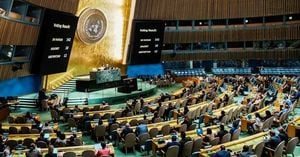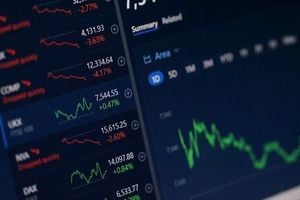U.S. President Donald Trump met with Nvidia CEO Jensen Huang on Friday to discuss concerns stemming from rising AI advancements coming out of China, particularly involving the Chinese company DeepSeek. The meeting, held at the White House, came as the administration prepares to impose new restrictions on AI chip exports aimed at keeping advanced technology within the United States and its allies.
DeepSeek has recently launched its AI model, which has taken the tech world by storm, prompting fears about the U.S. maintaining its dominance over artificial intelligence. The app became the most downloaded application on Apple's App Store within days of its release, erasing about $1 trillion from U.S. tech stocks, including significant losses for companies like Nvidia, which saw its shares drop as much as 17% at one point.
Trump summarized the meeting with Huang without divulging specifics but praised him as a “gentleman.” He stated, “I can’t say what’s gonna happen. We had a meeting. It was a good meeting.” According to sources familiar with the discussions, the meeting had been planned before the advent of DeepSeek’s AI assistant, indicating its significance as the U.S. grapples with the Chinese company's rapid advancements.
The urgency of the meeting is underscored by growing worries among U.S. officials about China’s capabilities closing the gap with the U.S. A spokesperson for Nvidia remarked, “We appreciated the opportunity to meet with President Trump and discuss semiconductors and AI policy,” emphasizing the importance of maintaining U.S. leadership in the technological sphere.
DeepSeek's release of its latest model marked the company's emergence as a formidable player within the marketplace. Analysts suggest the model’s competitive edge lies not only in functionality but also its cost-effectiveness compared to similar U.S. models. This rapid rise has provoked fears of a shift in the global AI balance of power.
The Trump administration's discussions on AI chip exports have intensified, especially concerning Nvidia’s H20 chips developed for the Chinese market. Reports indicate the administration is contemplating imposing strict regulations on these shipments, reflecting bipartisan concerns over China’s technological strides. Lawmakers from both sides of the aisle — including Republican John Moolenaar and Democrat Raja Krishnamoorthi, co-chairs of the House Select Committee on China — have called for tougher export restrictions. They argued it is necessary to review the existing U.S. export control system due to “developments involving strategic adversaries.”
The meeting speaks to broader U.S. efforts to curb the Chinese government’s access to cutting-edge technology and prevent its military and intelligence sectors from advancing their AI capabilities. Following restrictions by the previous Biden administration on sales of Nvidia’s most powerful AI chips, the company has continued to supply China with slightly modified versions, most recently the H800. These adaptations have allowed China continued access to powerful AI computing resources, raising concerns among U.S. officials about China’s capacity to innovate and grow its tech sector independently.
Industry experts have raised alarms about the ramifications of overly strict regulations on U.S. firms, warning it could hinder American competitiveness globally. Many argue the restrictions could backfire, as they might prompt China to develop its alternatives, circumventing U.S. limitations altogether.
The geopolitical stakes are high, with analysts viewing the current era as pivotal for U.S.-China relations and the global tech race. The DeepSeek model’s capabilities have transformed market perceptions, leading industry experts like Christopher Wood from Jefferies to declare the event as possibly the most consequential since Microsoft invested heavily in ChatGPT.
Trump's administration faces the dual challenge of protecting national security interests without stifling American innovation and market growth. This nuanced dynamic has prompted discussions about potential tariffs or policy adjustments, signaling the administration’s intention to recalibrate trade strategies concerning technology exports.
The White House is expected to expedite reviews of current AI trade policies. These forthcoming decisions may significantly influence AI exports, shaping the competitive dynamics not only between the U.S. and China but also affecting the entire global technology infrastructure.
With AI rapidly becoming the focal point of international rivalry, the stakes have never been higher for both nations. The decisions made by leaders like Trump and heads of major tech firms such as Nvidia will undoubtedly resonate through various sectors as they navigate the complex interplay of technology, trade, and national security.
How the U.S. engages with China on these issues will likely have far-reaching effects—not just for semiconductors but across the entire spectrum of technological advancement. The coming weeks and months promise to be consequential, determining not only the future of U.S.-China relations but also America's role on the global stage as the battle for AI supremacy continues.



